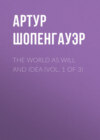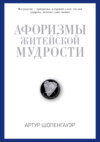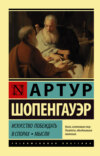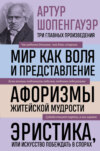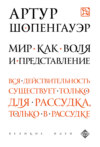Читать книгу: «The World as Will and Idea (Vol. 1 of 3)», страница 12
Spinoza (Epist. 62) says that if a stone which has been projected through the air had consciousness, it would believe that it was moving of its own will. I add to this only that the stone would be right. The impulse given it is for the stone what the motive is for me, and what in the case of the stone appears as cohesion, gravitation, rigidity, is in its inner nature the same as that which I recognise in myself as will, and what the stone also, if knowledge were given to it, would recognise as will. In the passage referred to, Spinoza had in view the necessity with which the stone flies, and he rightly desires to transfer this necessity to that of the particular act of will of a person. I, on the other hand, consider the inner being, which alone imparts meaning and validity to all real necessity (i. e., effect following upon a cause) as its presupposition. In the case of men this is called character; in the case of a stone it is called quality, but it is the same in both. When it is immediately known it is called will. In the stone it has the weakest, and in man the strongest degree of visibility, of objectivity. St. Augustine recognises, with a true instinct, this identity of the tendencies of all things with our own willing, and I cannot refrain from quoting his naïve account of the matter: – “Si pecora essemus, carnalem vitam et quod secundum sensum ejusdem est amaremus, idque esset sufficiens bonum nostrum, et secundum hoc si esset nobis bene, nihil aliud quæreremus. Item, si arbores essemus, nihil quidem sentientes motu amare possemus: verumtamen id quasi appetere videremur, quo feracius essemus, uberiusque fructuosæ. Si essemus lapides, aut fluctus, aut ventus, aut flamma, vel quid ejusmodi, sine ullo quidem sensu atque vita, non tamen nobis deesset quasi quidam nostrorum locorum atque ordinis appetitus. Nam velut amores corporum momenta sunt ponderum, sive deorsum gravitate, sive sursum levitate nitantur: ita enim corpus pondere, sicut animus amore fertur quocunque fertur” (De Civ. Dei, xi. 28).
It ought further to be mentioned that Euler saw that the inner nature of gravitation must ultimately be referred to an “inclination and desire” (thus will) peculiar to material bodies (in the 68th letter to the Princess). Indeed, it is just this that makes him averse to the conception of gravitation as it existed for Newton, and he is inclined to try a modification of it in accordance with the earlier Cartesian theory, and so to derive gravitation from the impact of an ether upon the bodies, as being “more rational and more suitable for persons who like clear and intelligible principles.” He wishes to banish attraction from physics as a qualitas occulta. This is only in keeping with the dead view of nature which prevailed at Euler's time as the correlative of the immaterial soul. It is only worth noticing because of its bearing upon the fundamental truth established by me, which even at that time this fine intellect saw glimmering in the distance. He hastened to turn in time, and then, in his anxiety at seeing all the prevalent fundamental views endangered, he sought safety in the old and already exploded absurdities.
We know that multiplicity in general is necessarily conditioned by space and time, and is only thinkable in them. In this respect they are called the principium individuationis. But we have found that space and time are forms of the principle of sufficient reason. In this principle all our knowledge a priori is expressed, but, as we showed above, this a priori knowledge, as such, only applies to the knowableness of things, not to the things themselves, i. e., it is only our form of knowledge, it is not a property of the thing-in-itself. The thing-in-itself is, as such, free from all forms of knowledge, even the most universal, that of being an object for the subject. In other words, the thing-in-itself is something altogether different from the idea. If, now, this thing-in-itself is the will, as I believe I have fully and convincingly proved it to be, then, regarded as such and apart from its manifestation, it lies outside time and space, and therefore knows no multiplicity, and is consequently one. Yet, as I have said, it is not one in the sense in which an individual or a concept is one, but as something to which the condition of the possibility of multiplicity, the principium individuationis, is foreign. The multiplicity of things in space and time, which collectively constitute the objectification of will, does not affect the will itself, which remains indivisible notwithstanding it. It is not the case that, in some way or other, a smaller part of will is in the stone and a larger part in the man, for the relation of part and whole belongs exclusively to space, and has no longer any meaning when we go beyond this form of intuition or perception. The more and the less have application only to the phenomenon of will, that is, its visibility, its objectification. Of this there is a higher grade in the plant than in the stone; in the animal a higher grade than in the plant: indeed, the passage of will into visibility, its objectification, has grades as innumerable as exist between the dimmest twilight and the brightest sunshine, the loudest sound and the faintest echo. We shall return later to the consideration of these grades of visibility which belong to the objectification of the will, to the reflection of its nature. But as the grades of its objectification do not directly concern the will itself, still less is it concerned by the multiplicity of the phenomena of these different grades, i. e., the multitude of individuals of each form, or the particular manifestations of each force. For this multiplicity is directly conditioned by time and space, into which the will itself never enters. The will reveals itself as completely and as much in one oak as in millions. Their number and multiplication in space and time has no meaning with regard to it, but only with regard to the multiplicity of individuals who know in space and time, and who are themselves multiplied and dispersed in these. The multiplicity of these individuals itself belongs not to the will, but only to its manifestation. We may therefore say that if, per impossibile, a single real existence, even the most insignificant, were to be entirely annihilated, the whole world would necessarily perish with it. The great mystic Angelus Silesius feels this when he says —
“I know God cannot live an instant without me,
He must give up the ghost if I should cease to be.”
Men have tried in various ways to bring the immeasurable greatness of the material universe nearer to the comprehension of us all, and then they have seized the opportunity to make edifying remarks. They have referred perhaps to the relative smallness of the earth, and indeed of man; or, on the contrary, they have pointed out the greatness of the mind of this man who is so insignificant – the mind that can solve, comprehend, and even measure the greatness of the universe, and so forth. Now, all this is very well, but to me, when I consider the vastness of the world, the most important point is this, that the thing-in-itself, whose manifestation is the world – whatever else it may be – cannot have its true self spread out and dispersed after this fashion in boundless space, but that this endless extension belongs only to its manifestation. The thing-in-itself, on the contrary, is present entire and undivided in every object of nature and in every living being. Therefore we lose nothing by standing still beside any single individual thing, and true wisdom is not to be gained by measuring out the boundless world, or, what would be more to the purpose, by actually traversing endless space. It is rather to be attained by the thorough investigation of any individual thing, for thus we seek to arrive at a full knowledge and understanding of its true and peculiar nature.
The subject which will therefore be fully considered in the next book, and which has, doubtless, already presented itself to the mind of every student of Plato, is, that these different grades of the objectification of will which are manifested in innumerable individuals, and exist as their unattained types or as the eternal forms of things, not entering themselves into time and space, which are the medium of individual things, but remaining fixed, subject to no change, always being, never becoming, while the particular things arise and pass away, always become and never are, – that these grades of the objectification of will are, I say, simply Plato's Ideas. I make this passing reference to the matter here in order that I may be able in future to use the word Idea in this sense. In my writings, therefore, the word is always to be understood in its true and original meaning given to it by Plato, and has absolutely no reference to those abstract productions of dogmatising scholastic reason, which Kant has inaptly and illegitimately used this word to denote, though Plato had already appropriated and used it most fitly. By Idea, then, I understand every definite and fixed grade of the objectification of will, so far as it is thing-in-itself, and therefore has no multiplicity. These grades are related to individual things as their eternal forms or prototypes. The shortest and most concise statement of this famous Platonic doctrine is given us by Diogenes Laertes (iii. 12): “ὁ Πλατων φησι, εν τῃ φυσει τας ιδεας ἑσταναι, καθαπερ παραδειγματα, τα δ᾽ αλλα ταυταις εοικεναι, τουτων ὁμοιωματα καθεστωτα” – (“Plato ideas in natura velut exemplaria dixit subsistere; cetera his esse similia, ad istarum similitudinem consistentia”). Of Kant's misuse of the word I take no further notice; what it is needful to say about it will be found in the Appendix.
§ 26. The lowest grades of the objectification of will are to be found in those most universal forces of nature which partly appear in all matter without exception, as gravity and impenetrability, and partly have shared the given matter among them, so that certain of them reign in one species of matter and others in another species, constituting its specific difference, as rigidity, fluidity, elasticity, electricity, magnetism, chemical properties and qualities of every kind. They are in themselves immediate manifestations of will, just as much as human action; and as such they are groundless, like human character. Only their particular manifestations are subordinated to the principle of sufficient reason, like the particular actions of men. They themselves, on the other hand, can never be called either effect or cause, but are the prior and presupposed conditions of all causes and effects through which their real nature unfolds and reveals itself. It is therefore senseless to demand a cause of gravity or electricity, for they are original forces. Their expressions, indeed, take place in accordance with the law of cause and effect, so that every one of their particular manifestations has a cause, which is itself again just a similar particular manifestation which determines that this force must express itself here, must appear in space and time; but the force itself is by no means the effect of a cause, nor the cause of an effect. It is therefore a mistake to say “gravity is the cause of a stone falling;” for the cause in this case is rather the nearness of the earth, because it attracts the stone. Take the earth away and the stone will not fall, although gravity remains. The force itself lies quite outside the chain of causes and effects, which presupposes time, because it only has meaning in relation to it; but the force lies outside time. The individual change always has for its cause another change just as individual as itself, and not the force of which it is the expression. For that which always gives its efficiency to a cause, however many times it may appear, is a force of nature. As such, it is groundless, i. e., it lies outside the chain of causes and outside the province of the principle of sufficient reason in general, and is philosophically known as the immediate objectivity of will, which is the “in-itself” of the whole of nature; but in etiology, which in this reference is physics, it is set down as an original force, i. e., a qualitas occulta.
In the higher grades of the objectivity of will we see individuality occupy a prominent position, especially in the case of man, where it appears as the great difference of individual characters, i. e., as complete personality, outwardly expressed in strongly marked individual physiognomy, which influences the whole bodily form. None of the brutes have this individuality in anything like so high a degree, though the higher species of them have a trace of it; but the character of the species completely predominates over it, and therefore they have little individual physiognomy. The farther down we go, the more completely is every trace of the individual character lost in the common character of the species, and the physiognomy of the species alone remains. We know the physiological character of the species, and from that we know exactly what is to be expected from the individual; while, on the contrary, in the human species every individual has to be studied and fathomed for himself, which, if we wish to forecast his action with some degree of certainty, is, on account of the possibility of concealment that first appears with reason, a matter of the greatest difficulty. It is probably connected with this difference of the human species from all others, that the folds and convolutions of the brain, which are entirely wanting in birds, and very weakly marked in rodents, are even in the case of the higher animals far more symmetrical on both sides, and more constantly the same in each individual, than in the case of human beings.34 It is further to be regarded as a phenomenon of this peculiar individual character which distinguishes men from all the lower animals, that in the case of the brutes the sexual instinct seeks its satisfaction without observable choice of objects, while in the case of man this choice is, in a purely instinctive manner and independent of all reflection, carried so far that it rises into a powerful passion. While then every man is to be regarded as a specially determined and characterised phenomenon of will, and indeed to a certain extent as a special Idea, in the case of the brutes this individual character as a whole is wanting, because only the species has a special significance. And the farther we go from man, the fainter becomes the trace of this individual character, so that plants have no individual qualities left, except such as may be fully explained from the favourable or unfavourable external influences of soil, climate, and other accidents. Finally, in the inorganic kingdom of nature all individuality disappears. The crystal alone is to be regarded as to a certain extent individual. It is a unity of the tendency in definite directions, fixed by crystallisation, which makes the trace of this tendency permanent. It is at the same time a cumulative repetition of its primitive form, bound into unity by an idea, just as the tree is an aggregate of the single germinating fibre which shows itself in every rib of the leaves, in every leaf, in every branch; which repeats itself, and to some extent makes each of these appear as a separate growth, nourishing itself from the greater as a parasite, so that the tree, resembling the crystal, is a systematic aggregate of small plants, although only the whole is the complete expression of an individual Idea, i. e., of this particular grade of the objectification of will. But the individuals of the same species of crystal can have no other difference than such as is produced by external accidents; indeed we can make at pleasure large or small crystals of every species. The individual, however, as such, that is, with traces of an individual character, does not exist further in unorganised nature. All its phenomena are expressions of general forces of nature, i. e., of those grades of the objectification of will which do not objectify themselves (as is the case in organised nature), by means of the difference of the individualities which collectively express the whole of the Idea, but show themselves only in the species, and as a whole, without any variation in each particular example of it. Time, space, multiplicity, and existence conditioned by causes, do not belong to the will or to the Idea (the grade of the objectification of will), but only to their particular phenomena. Therefore such a force of nature as, for example, gravity or electricity, must show itself as such in precisely the same way in all its million phenomena, and only external circumstances can modify these. This unity of its being in all its phenomena, this unchangeable constancy of the appearance of these, whenever, under the guidance of causality, the necessary conditions are present, is called a law of nature. If such a law is once learned from experience, then the phenomenon of that force of nature, the character of which is expressed and laid down in it, may be accurately forecast and counted upon. But it is just this conformity to law of the phenomena of the lower grades of the objectification of will which gives them such a different aspect from the phenomena of the same will in the higher, i. e., the more distinct, grades of its objectification, in animals, and in men and their actions, where the stronger or weaker influence of the individual character and the susceptibility to motives which often remain hidden from the spectator, because they lie in knowledge, has had the result that the identity of the inner nature of the two kinds of phenomena has hitherto been entirely overlooked.
If we start from the knowledge of the particular, and not from that of the Idea, there is something astonishing, and sometimes even terrible, in the absolute uniformity of the laws of nature. It might astonish us that nature never once forgets her laws; that if, for example, it has once been according to a law of nature that where certain materials are brought together under given conditions, a chemical combination will take place, or gas will be evolved, or they will go on fire; if these conditions are fulfilled, whether by our interposition or entirely by chance (and in this case the accuracy is the more astonishing because unexpected), to-day just as well as a thousand years ago, the determined phenomenon will take place at once and without delay. We are most vividly impressed with the marvellousness of this fact in the case of rare phenomena, which only occur under very complex circumstances, but which we are previously informed will take place if these conditions are fulfilled. For example, when we are told that if certain metals, when arranged alternately in fluid with which an acid has been mixed, are brought into contact, silver leaf brought between the extremities of this combination will suddenly be consumed in a green flame; or that under certain conditions the hard diamond turns into carbonic acid. It is the ghostly omnipresence of natural forces that astonishes us in such cases, and we remark here what in the case of phenomena which happen daily no longer strikes us, how the connection between cause and effect is really as mysterious as that which is imagined between a magic formula and a spirit that must appear when invoked by it. On the other hand, if we have attained to the philosophical knowledge that a force of nature is a definite grade of the objectification of will, that is to say, a definite grade of that which we recognise as our own inmost nature, and that this will, in itself, and distinguished from its phenomena and their forms, lies outside time and space, and that, therefore, the multiplicity, which is conditioned by time and space, does not belong to it, nor directly to the grade of its objectification, i. e., the Idea, but only to the phenomena of the Idea; and if we remember that the law of causality has significance only in relation to time and space, inasmuch as it determines the position of the multitude of phenomena of the different Ideas in which the will reveals itself, governing the order in which they must appear; if, I say, in this knowledge the inner meaning of the great doctrine of Kant has been fully grasped, the doctrine that time, space, and causality do not belong to the thing-in-itself, but merely to the phenomenon, that they are only the forms of our knowledge, not qualities of things in themselves; then we shall understand that this astonishment at the conformity to law and accurate operation of a force of nature, this astonishment at the complete sameness of all its million phenomena and the infallibility of their occurrence, is really like that of a child or a savage who looks for the first time through a glass with many facets at a flower, and marvels at the complete similarity of the innumerable flowers which he sees, and counts the leaves of each of them separately.
Thus every universal, original force of nature is nothing but a low grade of the objectification of will, and we call every such grade an eternal Idea in Plato's sense. But a law of nature is the relation of the Idea to the form of its manifestation. This form is time, space, and causality, which are necessarily and inseparably connected and related to each other. Through time and space the Idea multiplies itself in innumerable phenomena, but the order according to which it enters these forms of multiplicity is definitely determined by the law of causality; this law is as it were the norm of the limit of these phenomena of different Ideas, in accordance with which time, space, and matter are assigned to them. This norm is therefore necessarily related to the identity of the aggregate of existing matter, which is the common substratum of all those different phenomena. If all these were not directed to that common matter in the possession of which they must be divided, there would be no need for such a law to decide their claims. They might all at once and together fill a boundless space throughout an endless time. Therefore, because all these phenomena of the eternal Ideas are directed to one and the same matter, must there be a rule for their appearance and disappearance; for if there were not, they would not make way for each other. Thus the law of causality is essentially bound up with that of the permanence of substance; they reciprocally derive significance from each other. Time and space, again, are related to them in the same way. For time is merely the possibility of conflicting states of the same matter, and space is merely the possibility of the permanence of the same matter under all sorts of conflicting states. Accordingly, in the preceding book we explained matter as the union of space and time, and this union shows itself as change of the accidents in the permanence of the substance, of which causality or becoming is the universal possibility. And accordingly, we said that matter is through and through causality. We explained the understanding as the subjective correlative of causality, and said matter (and thus the whole world as idea) exists only for the understanding; the understanding is its condition, its supporter as its necessary correlative. I repeat all this in passing, merely to call to mind what was demonstrated in the First Book, for it is necessary for the complete understanding of these two books that their inner agreement should be observed, since what is inseparably united in the actual world as its two sides, will and idea, has, in order that we might understand each of them more clearly in isolation, been dissevered in these two books.
It may not perhaps be superfluous to elucidate further by an example how the law of causality has meaning only in relation to time and space, and the matter which consists in the union of the two. For it determines the limits in accordance with which the phenomena of the forces of nature divide themselves in the possession of matter, while the original forces of nature, as the immediate objectification of will, which, as a thing in itself, is not subordinated to the principle of sufficient reason, lie outside these forms, within which alone all etiological explanation has validity and meaning, and just on that account can never lead us to the inner reality of nature. For this purpose let us think of some kind of machine constructed according to the laws of mechanics. Iron weights begin the motion by their gravity; copper wheels resist by their rigidity, affect and raise each other and the lever by their impenetrability, and so on. Here gravity, rigidity, and impenetrability are original unexplained forces; mechanics only gives us the condition under which, and the manner in which, they manifest themselves, appear, and govern a definite matter, time, and place. If, now, a strong magnet is made to attract the iron of the weight, and overcome its gravity, the movement of the machine stops, and the matter becomes forthwith the scene of quite a different force of nature – magnetism, of which etiology again gives no further explanation than the condition under which it appears. Or let us suppose that the copper discs of such a machine are laid upon zinc plates, and an acid solution introduced between them. At once the same matter of the machine has become subject to another original force, galvanism, which now governs it according to its own laws, and reveals itself in it through its phenomena; and etiology can again tell us nothing about this force except the conditions under which, and the laws in accordance with which, it manifests itself. Let us now raise the temperature and add pure acid; the whole machine burns; that is to say, once more an entirely different force of nature, chemical energy, asserts at this time and in this place irresistible claims to this particular matter, and reveals itself in it as Idea, as a definite grade of the objectification of will. The calcined metal thus produced now unites with an acid, and a salt is obtained which forms itself into crystals. These are the phenomena of another Idea, which in itself is again quite inexplicable, while the appearance of its phenomena is dependent upon certain conditions which etiology can give us. The crystals dissolve, mix with other materials, and vegetation springs up from them – a new phenomenon of will: and so the same permanent matter may be followed ad infinitum, to observe how now this and now that natural force obtains a right to it and temporarily takes possession of it, in order to appear and reveal its own nature. The condition of this right, the point of time and space at which it becomes valid, is given by causality, but the explanation founded upon this law only extends thus far. The force itself is a manifestation of will, and as such is not subject to the forms of the principle of sufficient reason, that is, it is groundless. It lies outside all time, is omnipresent, and seems as it were to wait constantly till the circumstances occur under which it can appear and take possession of a definite matter, supplanting the forces which have reigned in it till then. All time exists only for the phenomena of such a force, and is without significance for the force itself. Through thousands of years chemical forces slumber in matter till the contact with the reagents sets them free; then they appear; but time exists only for the phenomena, not for the forces themselves. For thousands of years galvanism slumbered in copper and zinc, and they lay quietly beside silver, which must be consumed in flame as soon as all three are brought together under the required conditions. Even in the organic kingdom we see a dry seed preserve the slumbering force through three thousand years, and when at last the favourable circumstances occur, grow up as a plant.35
If by this exposition the difference between a force of nature and all its phenomena has been made quite distinct; if we have seen clearly that the former is the will itself at this particular grade of its objectification, but that multiplicity comes to phenomena only through time and space, and that the law of causality is nothing but the determination of the position of these phenomena in time and space; then we shall recognise the complete truth and the deep meaning of Malebranche's doctrine of occasional causes (causes occasionelles). It is well worth while comparing this doctrine of his, as he explains it in the “Recherches de la Vérite,” both in the 3rd Chapter of the second part of the 6th Book, and in the éclaircissements appended to this chapter, with this exposition of mine, and observing the complete agreement of the two doctrines in the case of such different systems of thought. Indeed I cannot help admiring how Malebranche, though thoroughly involved in the positive dogmas which his age inevitably forced upon him, yet, in such bonds and under such a burden, hit the truth so happily, so correctly, and even knew how to combine it with these dogmas, at all events verbally.
For the power of truth is incredibly great and of unspeakable endurance. We find constant traces of it in all, even the most eccentric and absurd dogmas, of different times and different lands, – often indeed in strange company, curiously mixed up with other things, but still recognisable. It is like a plant that germinates under a heap of great stones, but still struggles up to the light, working itself through with many deviations and windings, disfigured, worn out, stunted in its growth, – but yet, to the light.
In any case Malebranche is right: every natural cause is only an occasional cause. It only gives opportunity or occasion for the manifestation of the one indivisible will which is the “in-itself” of all things, and whose graduated objectification is the whole visible world. Only the appearance, the becoming visible, in this place, at this time, is brought about by the cause and is so far dependent on it, but not the whole of the phenomenon, nor its inner nature. This is the will itself, to which the principle of sufficient reason has not application, and which is therefore groundless. Nothing in the world has a sufficient cause of its existence generally, but only a cause of existence just here and just now. That a stone exhibits now gravity, now rigidity, now electricity, now chemical qualities, depends upon causes, upon impressions upon it from without, and is to be explained from these. But these qualities themselves, and thus the whole inner nature of the stone which consists in them, and therefore manifests itself in all the ways referred to; thus, in general, that the stone is such as it is, that it exists generally – all this, I say, has no ground, but is the visible appearance of the groundless will. Every cause is thus an occasional cause. We have found it to be so in nature, which is without knowledge, and it is also precisely the same when motives and not causes or stimuli determine the point at which the phenomena are to appear, that is to say, in the actions of animals and human beings. For in both cases it is one and the same will which appears; very different in the grades of its manifestation, multiplied in the phenomena of these grades, and, in respect of these, subordinated to the principle of sufficient reason, but in itself free from all this. Motives do not determine the character of man, but only the phenomena of his character, that is, his actions; the outward fashion of his life, not its inner meaning and content. These proceed from the character which is the immediate manifestation of the will, and is therefore groundless. That one man is bad and another good, does not depend upon motives or outward influences, such as teaching and preaching, and is in this sense quite inexplicable. But whether a bad man shows his badness in petty acts of injustice, cowardly tricks, and low knavery which he practises in the narrow sphere of his circumstances, or whether as a conqueror he oppresses nations, throws a world into lamentation, and sheds the blood of millions; this is the outward form of his manifestation, that which is unessential to it, and depends upon the circumstances in which fate has placed him, upon his surroundings, upon external influences, upon motives; but his decision upon these motives can never be explained from them; it proceeds from the will, of which this man is a manifestation. Of this we shall speak in the Fourth Book. The manner in which the character discloses its qualities is quite analogous to the way in which those of every material body in unconscious nature are disclosed. Water remains water with its intrinsic qualities, whether as a still lake it reflects its banks, or leaps in foam from the cliffs, or, artificially confined, spouts in a long jet into the air. All that depends upon external causes; the one form is as natural to it as the other, but it will always show the same form in the same circumstances; it is equally ready for any, but in every case true to its character, and at all times revealing this alone. So will every human character under all circumstances reveal itself, but the phenomena which proceed from it will always be in accordance with the circumstances.
Покупайте книги и получайте бонусы в Литрес, Читай-городе и Буквоеде.
Участвовать в бонусной программе
